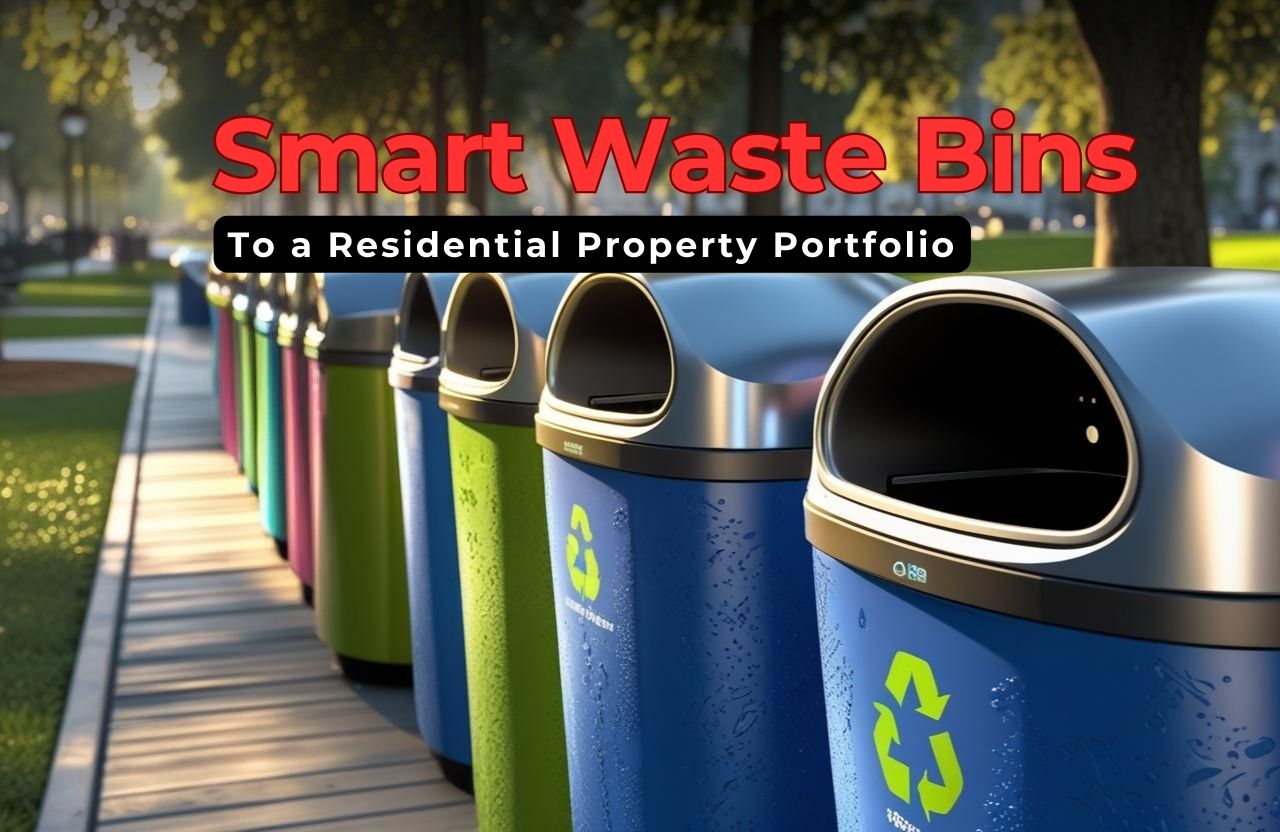In the fast-paced and ever-changing urban landscape, efficient waste management has never been more important. Properties in the residential property portfolio, from small apartment buildings to large communities are always dealing with issues related to waste disposal and getting things recycled. Smart Waste Bins are the advanced technology on the remarkable journey of waste management in residential settings. If you manage a collection of smart waste bins as part of a parceled residential property portfolio, you have the power to drive efficiencies in your waste management operations, save money and create a greener and cleaner environment.
What Are Smart Waste Bins?
Smart Waste Bins are not your everyday trash cans. Smart bins are able to provide data-driven waste tracking, management and reporting through connectivity or Internet of Things (IoT) sensors.
Smart Waste bins can measure the amount of waste in real time, report their degree of fullness to customers and optimize collection schedules.
Unlike regular bins, Smart bins can notify waste management teams when they are near capacity, which cuts down on services that are often meaningless (think twice empty bins and expensive pickup fees) and when one of their bins become full, an overflowing bin can create an unsightly mess on the road, sidewalk or parking lot.
These bins typically add features like:
- Fill-level sensors
- Compaction mechanisms to raise capacity
- GPS tracking for route optimization
- Solar panels for green power
- Data analytics dashboards for waste monitoring
Through utilizing these functionalities, smart waste bins transform waste management, particularly in high-density residential areas.
Why Do Residential Properties Need Smart Waste Bins?
1. Enhance Waste Collection
Efficiency In home properties, there can be irregular waste collection, resulting in full bins or unnecessary collection trips. With smart waste bins, collection teams get notified only when bins are full, thus eliminating fixed time schedules that tend to squander resources. This enhances the efficiency of operations and reduces fuel use.
2. Enhance Resident Satisfaction
It is easy to understand why residents may be upset and a property may suffer a bad reputation due to garbage overload or odorous waste. Smart bins help eliminate the opportunities for these situations to arise, since the schedule to empty and service them can be performed in a timely manner. Additionally, some smart bins come with a reversible compartment for recycling to help encourage residential behaviour in disposing of waste improperly.
3. Support sustainability and recycling goals
Most residential neighborhoods are now working towards environmental sustainability. Smart trash cans aid in better recycling through the provision of waste segregation data and assisting in the customization of recycling programs. This supports the requirements of local government regulations and environmental certification.
4. Lower Operating Costs
Smart waste bins can reduce your operating costs by reducing waste collection trips and emissions associated with not collecting, before addressing landfill costs. It is then saved and used to fund other property upgrades and hence it is a win-win for the residents and property managers.
Implementing Smart Waste Bins in Your Residential Property Portfolio
It requires planning, coordination and communication. Carrying out the following steps will ensure that you get waste bins installed and operational.
Step 1: Assess Your Current Waste Management
Begin by assessing your current waste management system. Identify pains such as filled bins, lost collection or low recycling rates. Ask residents about their worries and wants. This baseline will help you when setting measurable goals for your smart waste bin program.
Step 2: Choose the Right Smart Waste Bin Technology
There are a number of different smart waste bin models, each with special features for specific uses. Most residential neighbourhoods are striving to work on environmental sustainability.
When researching smart bins for your property, consider:
- Sensor technologies: Ultrasonic, infrared or weights sensors
- Power source: Solar powered systems help reduce dependency on external power sources.
- Compaction: Waste bins with compacting capabilities will compress the waste material to maximize the maximum capacity of the unit and use or increased efficiencies to reduce frequency of collections.
- Connectivity: Bins should be able to connect to reliable networks (e.g. Wi-Fi, LoRaWAN, NB-IoT) to allow real time volume and capacity measurements.
- Robustness and appearance: The bins will need to withstand the local weather and usage situation, but they should also look good on the property.
Contact vendors or manufacturers of smart bins and set up a demo to get an idea of what products suit your needs best.
Step 3: Manage Logistics and Installation
Coordinate with the installation with your smart waste bin supplier. Considerations include:
- Strategic bin positioning at locations with maximum usage or traffic.
- Providing convenient access for collecting vehicles.
- Staff or resident training on how to use the system correctly and gain advantages from it.
Installation also plays a major role to achieve maximum effectiveness of smart waste bins.
Step 4: Implement Data Monitoring and Analytics
One of the advantages of smart waste bins is the data they provide. Use the vendor’s dashboards to monitor waste, productivity of collection and with how many residents are engaged. Data insights assist in route optimization, maintenance scheduling and opportunities for recycling improvement.
Step 5: Engage Residents and Educate Them on Benefits
Educate residents on how smart waste bins operate and how they provide environmental benefit to the neighborhood as well as service enhancements. There are many options that are available for you to do this: newsletters, signage or information updates at neighborhood meetings.
Get residents to support the project and work with you to make sure it is successful. Emphasize the goals of preventing odors and pests and increased recycling; and how these goals can be achieved with the smart waste bin system.
Benefits of Smart Waste Bins for Residents and Homeowners
- Real-Time Waste Monitoring
Smart waste bins provide real time information to the property manager about how much rubbish is in the bin. This information allows for proper collection planning and to avoid overflowing bins.
- Reduce carbon footprint.
More efficient collection routes and frequencies help reduce carbon emissions and fuel usage.
- Increased Recycling
Data tracking and separate compartments promote better segregation and increased recycling rates.
- Cost Savings
Infrequent data-driven collections result in fuel, labor and maintenance cost savings.
- Healthier, Cleaner Communities
Practical and timely collection of discarded materials is healthier for residents and prettier for communities.
Addressing Barriers for Smart Waste Bins
While these arguments present an attractive case, we still need to confront the barriers to the implementation of smart waste bins:
- Upfront Capital: Smart waste bins require initial upfront capital investment for purchase and connection. The benefits realized from smart waste bins generally outweigh the initial capital throughout the long term.
- Changing Behaviours: Change management will be required in the project. Communication and education will create the path to discomfort for residents to help them change behaviours to focus on sorting and disposal changes.
- Data Issues: Any data that is collected and exists in the public domain from smart waste bins must respect the privacy of residents.
- Change Maintenance: Sensor maintenance (i.e. formally adjusting and updating software) will provide connectivity and accurate data.
Real-World Examples of Smart Waste Bin Success
Case Study 1: Urban Residential Complex in India
A major residential complex implemented intelligent waste bins with fill-level sensors and GPS. Within six months, there was a 30% reduction in collection trips and a 25% increase in recycling.
Case Study 2: Green Housing Community in Europe
The community implemented solar-powered intelligent bins with compaction technology. Residents found the odor and pest problems minimized and property managers realized sizable cost savings in operation.
The Progression of Waste Management in Residential Estates
Smart waste bins are just the beginning of smart city solutions transforming the urban landscape. Innovative waste management through IoT connections, AI analytics and sustainable delivery are just getting started and smart waste management will only become more improved with time and offers so much more appeal.
For residential property portfolios, the smart waste bin is an intentional move toward operational excellence, resident wellbeing and social responsibility.
Conclusion: Be Prepared to Make the Smart Move with Smart Waste Bin
The smart waste bin is a great addition to the residential property portfolio to help solve the modern effective waste management conundrum. It improves efficiency, reduces costs, promotes sustainability and creates better living standards.
Ready to smarten up waste management? Begin planning your smart waste bin deployment today and guide your property portfolio toward a cleaner and greener future.













